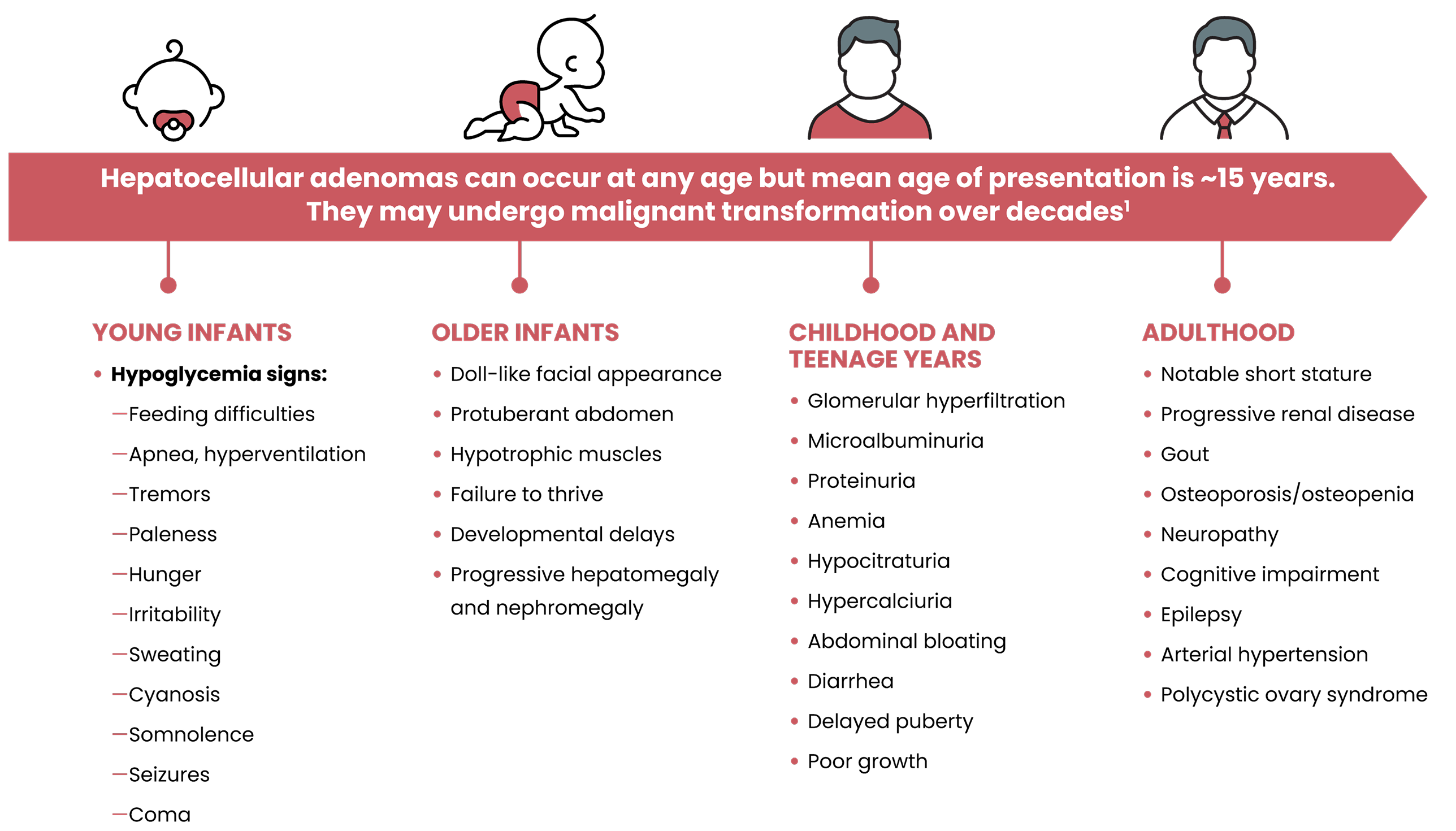This site uses cookies to provide you with a more responsive and personalized service. By clicking "Accept," you agree to the use of cookies on this site. Please read our Cookie Policy and Privacy Policy for more information on the use of cookies on this website.
Patients face a daily risk of life-threatening hypoglycemia and are vulnerable to serious long-term complications1,2
For patients with GSDIa, maintaining glucose homeostasis is a lifelong challenge that places them at risk of severe hypoglycemia and its complications, including developmental and physical delays, seizures, cerebral damage, and death.1,2 Even with adherence to a prescribed nutrition plan and cornstarch regimen, patients may develop hypoglycemia due to fluctuations in metabolic demands (eg, during exercise, illness, puberty, pregnancy).2 Persistent metabolic instability may lead to serious, multisystemic complications that can significantly impact quality of life.2,3
Multisystemic complications of GSDIa1,2,5*
Hepatic
Hepatomegaly, hepatic steatosis, hepatocelullar adenomas
(HCAs), and hepatocellular carcinoma (HCC)
HCAs occur in 70%-80% of individuals older than 25
years of age, and progress to HCC in 10% of cases
Renal
Nephromegaly, progressive nephropathy, chronic kidney disease, renal
failure, and nephrolithiasis
Renal dysfunction can be seen in childhood and commonly develops by teenage years. Dysfunction can progress to end-stage renal disease, requiring dialysis or kidney transplantation
Other
- Hypertension
- Pulmonary hypertension
- Anemia/bleeding diathesis
- Osteoporosis
- Pancreatitis
- Gout
- Physical and developmental delays, short stature
- Obesity, metabolic syndrome, disordered eating, and malnutrition associated with current disease management
- Polycystic ovary syndrome
- Xanthomas
*Disease course may vary by patient and this list is not representative of all possible complications of GSDIa.

Abbreviations: GSDIa, glycogen storage disease type Ia; HCA, hepatocellular adenoma;
HCC, hepatocellular carcinoma.
References: 1. Kishnani PS, Austin SL, Abdenur JE, et al. Diagnosis
and management of glycogen storage disease type I: a practice guideline of the American College of Medical
Genetics and Genomics. Genet Med. 2014;16(11):e1. 2. Derks
TGJ, Rodriguez-Buritica DF, Ahmad A, et al. Glycogen storage disease type Ia: current management options,
burden and unmet need. Nutrients. 2021;13(11):3828. 3. Bali
DS, El-Gharbawy A, Austin S, et al. Glycogen storage disease type I. 2006. In: Adam MP, Feldman J, Mirzaa
GM, et al, eds. GeneReviews® [Internet]. Seattle (WA): University of Washington, Seattle; 1993-2024.
Accessed June 27, 2025. 4. Ozen H. Glycogen storage diseases: new
perspectives. World J Gastroenterol. 2007;13(18):2541-2553. 5. Cho JH, Lee YM, Bae SH, Chou JY. Activation of tumor-promoting pathways implicated
in hepatocellular adenoma/carcinoma, a long-term complication of glycogen storage disease type Ia.
Biochem Biophys Res Commun. 2020;522(1):1-7.
